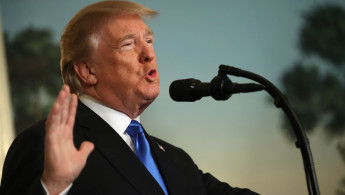Trump reinstates sanctions on Iran, pulls out of nuclear deal
US President Donald Trump will reinstate sanctions on Iran after pulling out of a nuclear deal with Tehran, which he insists was "very badly negotiated".
In a hard-won deal struck in 2015, Iran agreed to freeze its nuclear programme in return for the lifting of punishing international sanctions.
Explainer: The landmark 2015 Iran nuclear deal
It was a breakthrough that ended a 12-year stand-off between Iran and the West, following concerns Tehran was developing a nuclear bomb.
Trump, who dismissed the landmark deal as "insane" and "ridiculous", made good on his threat to reinstate sanctions on Tehran - as well as impose additional economic penalties. Signing a presidential declaration on Tuesday afternoon, he called it a "horrible, one-sided deal".
Speaking at the White House, Trump said the move would "block [Iran's] menacing actions across the Middle East".
"If the regime continues its nuclear aspirations, it will have bigger problems than it ever has before...
Twitter Post
|
"The future of Iran belongs to its people," he added, saying he would be willing to re-open talks on a future deal.
While regime change is clearly a goal for Washington's power elites, it is difficult to imagine a ruling class coming into power in Tehran that would be any more amenable to the United States.
Scrapping nuclear deal would weaken moderates and embolden hardliners in Iran
"Great things can happen for Iran and great things can happen for the peace and stability that we all want to see in the Middle East," the president concluded.
European allies, who remain committed to the deal, have been in talks with the US for the past few months to convince Trump to uphold the accords.
French President Emmanuel Macron has proposed an additional deal that extends Iran's nuclear restrictions while also curbing its ballistic missile programme and Tehran-controlled militias in the Middle East.
German Chancellor Angela Merkel made a similar pitch when visiting Washington in person in the hopes of convincing Trump.
From the archives: Donald Trump doesn't understand the art of the Iran deal
French officials said on Tuesday that they would continue to push for a broader deal with Iran "whether the United States participates or not".
France, Germany and the UK are working to minimise the damage of a US withdrawal from the pact, worried that an escalation could aggravate already tense relations.
Twitter Post
|
Some Iranian leaders have signalled they might seek to rapidly restore the enrichment capabilities they surrendered under the deal and European capitals fear Tehran may resume the hunt for a bomb.
US withdrawal from Iran nuclear deal 'will spark a Middle East arms race', warns Jordan
Tehran has long insisted it has no ambition to build nuclear weapons, but the signatories to the deal never believed them, and supporters of the accord have warned of a Middle East arms race if it fails.
And they are sceptical that Trump's administration has a back-up plan to restrain Iranian ambitions once he has made good on his campaign promise to tear up a deal endorsed by his predecessor, Barack Obama.
Iran's President Hassan Rouhani on Sunday issued a strong warning to the United States not to quit the pact.
"If the United States leaves the nuclear agreement, you will soon see that they will regret it like never before in history," Rouhani said.
He also vehemently reiterated his country's opposition to curtailing its non-nuclear missile capabilities, insisting Tehran "will build as many missiles and weapons as needed".





 Follow the Middle East's top stories in English at The New Arab on Google News
Follow the Middle East's top stories in English at The New Arab on Google News


